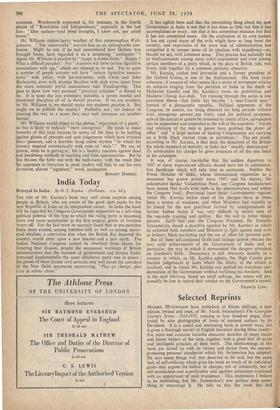India Today
Betrayal in India. By D. F. Karaka. ' (Gollancz, I as. 6d.) tTHE title of Mr. Karaka's book may well cause surprise among people in Britain, who are aware of the good start made by the new Republic of India on its independent career. In India the book will be regarded by Congress Government supporters as a left-wing political polemic of the type to which the ruling party is becoming more and more accustomed as the first magical glitter of freedom wears off. For the fact must be squarely faced that in pre-partition India there existed, among humbler folk as well as among starry- eyed idealists, a conviction that when the British Raj departed the country would enter upon a new heaven and a new earth. The Indian National Congress cannot be absolved from blame for fostering that illusion, despite the occasional warnings of British administrators that the business of government and human frailty remained fundamentally the same whichever party was in power ; he ghosts of these former civil servants may well haunt the corridors f the New Delhi secretariat murmuring, "Plus fa change, plus 'est la meme chose." i It has rightly been said that the astonishing thing, about the new • Government in India is not that it has done so little but that it has accomplished so much ; not that it has committed mistakes but that it has not committed more. On the confession of its own leaders it has not cured many of the evils which have .so long beset the country, and experience of the stern task of administration has compelled it to temper some of its idealism with expediency—or, should we say, with common sense. This process has naturally led to disillusionment among some non-Congressmen and even among certain members of a party which, in the days of British rule, was firmly held together by a common patriotic objective.
Mr. Karaka, author and journalist and a former president of the Oxford .Union, is one of the disillusioned. His book lacks cohesion ; it consists of what seems like a series of newspaper articles on subjects ranging from the partition of India to the death of Mahatma Gandhi and Mr. Karaka's views on prohibition and Madame .Chiang Kai-shek. Yet running through the series is one consistent theme—that India has become " a near-Fascist state " instead of a democratic republic. Political opponents of the Congress, he asserts, are being, detained for long periods without trial, emergency powers are freely used for political purposes, acts of the executive cannot be reviewed by courts of law, newspapers can be suppressed and suspended at the will of the executive, " friends and relations of the men in power have grabbed the plum,- of office " and " a large section of leading Congressmen are carrying on a brisk black market trade in patriotism." The net result, according to Mr. Karaka; is that since the departure of the British the whole standard of morality in India has " steadily deteriorated." To substantiate his charges he gives instances of all the sins listed in his catalogue.
It was, of course, inevitable that the sudden departure in 1947 of many experienced officials should have led to administra- tive handicaps which will take time to surmount. Neither the Prime Minister of India, whose international reputation as a statesman has grown greatly since 1947, and his deputy, the redoubtable Sardar Vallabhbhai Patel, nor Congress headquarters have denied that faults exist both in the Administration and within the Congress itself. Provincial (now State) Governments—against which Mr. Karaka makes most of his charges—have at times been a source of weakness, and when Ministers had recently to be found for the new provinces formed by amalgamations of former Indian States it was very difficult to secure men of the requisite training and calibre. But the will to better things persists. Early last year the Congress President, Dr. Pattabhi Sitaramayya, issued a directive (quoted by Mr. Karaka) in which he exhorted both members and Ministers to fight against such evils as bribery, black-marketing and the use of office for personal gain.
But all these self-confessed faults and failings cannot obscure the very solid achievements of the Government of India and, in particular, the way in which it surmounted the dangers attendant on freedom's birth. Democracy is still obviously healthy in a country in which, as Mr. Karaka admits, the High Courts give fearless judgements in cases where the liberty of the citizen is involved, and in which Mr. Karaka can publish his trenchant con- demnation of the Government without forfeiting his freedom. And in the next elections, based on adult suffrage, the voters will pre- sumably be free to record their verdict on the Government's record.
FRANCIS Low.














































 Previous page
Previous page